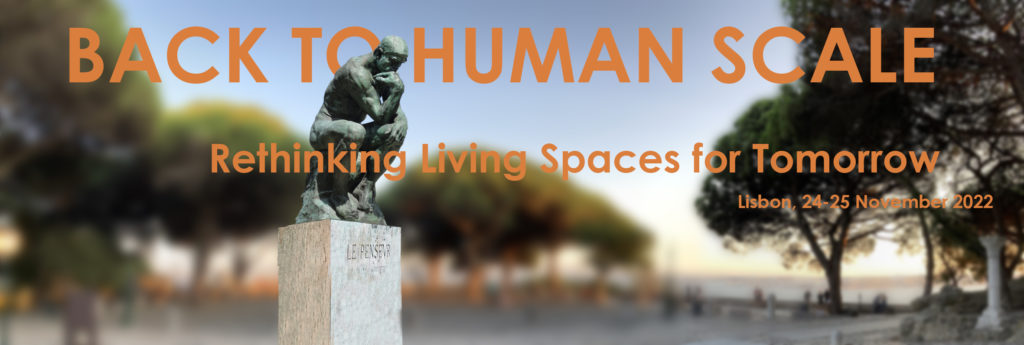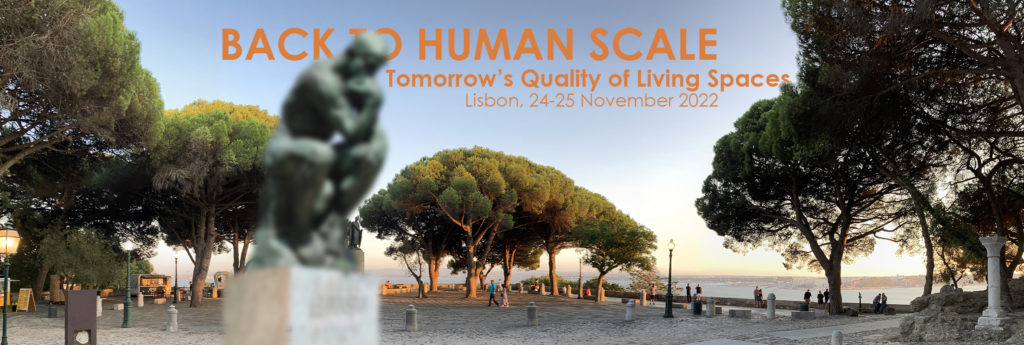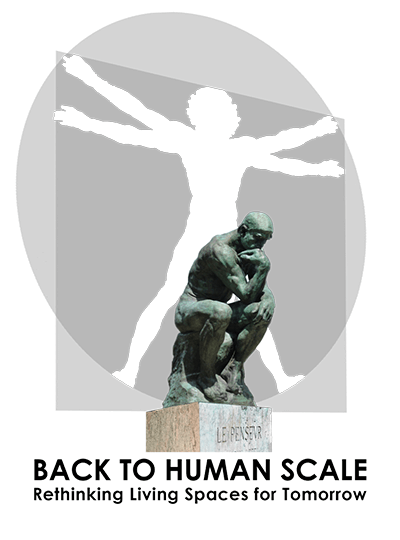Tomorrow’s Architecture, Landscapes and Territories.
The current context in which we live emphasises crises of climate change and health pandemic and focuses attention on ecological systems at a planetary scale. However, the scale of the living spaces of our daily life is less and less explored, or at least reduced to quantitative figures serving as a support for approaches, reasoning, or political and economic agendas.
This meeting propose that consideration of the human scale is relevant when thinking ecologically and will allow inclusion of qualitative considerations as well as quantitative ones in a more comprehensive than apprehensive way.
The challenge of this meeting is therefore to re-introduce the human scale at the core of our analyses and strategies, when ‘thinking ecologically’ about the cities of tomorrow.
The current situation of stress that has emerged from the world health crisis has led to sharp social distances which is entirely against the grain to all the notions of proxemics that have so far been discussed since E.T. Hall. It reduced all that social richness distances to a single standard sanitary one. In the other hand, mediated sociability, that technological curiosity highly valued by online game players which virtualizes our social distance, is becoming a new standard practice, both in work and leisure situations, as a means to relate to others. The ‘human scale’ urgently needs re-visiting and deserves, in our view, to be explored with the same precision as all the themes that relate to the human milieu. One suggests here to set this as our collective challenge, during this meeting.  Indeed, isn’t it in the home that issues such as comfort, home-economics, rational thinking, and our perception of space all merge into one terrain for exploration and expression, which later can help us to make sense of all encompassing scales?
Indeed, isn’t it in the home that issues such as comfort, home-economics, rational thinking, and our perception of space all merge into one terrain for exploration and expression, which later can help us to make sense of all encompassing scales?
Isn’t it also from our very home that issues of ‘sensitive space’ and ‘in-situ perception’, of actions undertaken by the inhabitant, later spread into the urban sphere and impact even further? Isn’t it at his/her human scale that the inhabitant is fully ‘acting’ and responsible? His/her transformative action in the inhabited milieu becomes the most visible and sensitive manifestation of his/her being because of its immediate nature.
Transformations at higher eco-systemic levels might often take place at a slower pace than within our societies and hence affect our perception of change, disturbing our sense of urgency. This meeting invites us to (re-) think about how to improve the natural and social habitats and the relationship to the immediate surroundings. It is suggested to do this by questioning how one could re-explore the built environment and ensure that it creates strong bridges with the natural environment even if the goal is to isolate us from it.
How to rethink the inhabited environment, our relationship to the immediate environment, how to re-examine the built space today which interfaces, isolates us and serves as an instrument of relationship to the urban or natural environment? how is architectural and urban production at the same time an action of construction on a human scale and of destruction on a planetary scale?
Are welcome all works and thoughts on architecture, atmospheres, landscapes, and the territory, which explore the responsible relationship between our built environment and natural habitats, from a ‘human scale’ perspective. This meeting is an international event and perspectives from various contexts are highly valued.

About the Meeting
Back to Human Scale is organized by Universidade Lusófona
- ARQ.ID |Arquitetura, Investigação e Desenvolvimento, with the collaboration of,
- CeiED | Interdisciplinary Research Centre for Education and Development, by Urban Planning team
- Faculty of Engineering
Main Indicative Topics
Leaping scales
- Theoretical framework
- Inclusive approaches
- Design and creative solutions
- New public-private boundaries
Creating atmospheres and ambiances
- Inhabitants’ experiences and new practices
- Architectural and urban atmospheres | Ambiances
- Lessons learned from vernacular experiences
Combining and intermingling uses
- Continuous Productive Urban Landscape, and Alternative Food Networks
- Urban public spaces, between computational and human scale
- Inclusive mobilities concepts
- Mechanical versus pedestrian territories
Others
- Not limited to the above
Important Dates
| Deadline for abstract submission | CLOSED | |
| Deadline for full paper submission | CLOSED | |
| Meeting | 24/11/22 | |
| 25/11/22 |
Chair and Committees
Steering Committee
- Chair Mohammed Boubezari
- Cochair Sandrine Simon
Organising Committee
- Crisolita Fonseca
- Joaquim Borges Martins
- Mohammed Boubezari
- Sandrine Simon
- Tania Mara
Scientific Committee
| Name | Institution | Contry |
| Ana Neiva | ULP | Portugal |
| Carlos Smaniotto Costa | ULHT | Portugal |
| Cecile Regnault | ENSLyon | France |
| Damien Masson | CY Cergy Paris Université | France |
| Diogo Mateus | ULHT | Portugal |
| Edite Rosa | ULP | Portugal |
| Elói Figueiredo | ULHT | Portugal |
| Ethel Pinheiro | FAU/UFRJ Rio de Janeiro | Brazil |
| Evangelia Paxinou | Chercheure Associée, CRESSON | Greece |
| Fernando Monteiro Figueira | ULHT | Portugal |
| Filipa Antunes | ULHT | Portugal |
| Francisco Portugal e Gomes | ULHT | Portugal |
| Graça Correia Ragazzi | ULP | Portugal |
| Isabel Marcos | CFCUL, C. Filosofia das Ciências | France |
| Israel Guarda | Inst. História da Arte. NOVA | Portugal |
| Jean Caldieron | Florida Atlantic University | USA |
| João Borges da Cunha | ULHT | Portugal |
| Jorge Bruno | ULHT | Portugal |
| Lígia Nunes | ULP | Portugal |
| Lucimar Dantas | ULHT | Portugal |
| Luis Claudio Ribeiro | ULHT | Portugal |
| Luisa Paiva Sequeira | ULHT | Portugal |
| Maria Rita Pais | ULHT | Portugal |
| Marluci Menezes | LNEC, Lisbon | Portugal |
| Nicolas Remy | Dep Architecture, Thessaly | Greece |
| Paulette Duarte | UGA, Grenoble | France |
| Pedro Maia | ULP | Portugal |
| Rosália Guerreiro | ISCTE-Lisbon | Portugal |
| Sami Boufassa | University of Bejaia | Algeria |
| Sérgio Koch | ULP | Portugal |
NEXT >>
Avenida do Campo Grande,
376 1749-024 Lisboa, Portugal
Tel.: 217 515 500 | email: info@ulusofona.ptPorto
Rua Augusto Rosa,
Nº 24, 4000-098 Porto - Portugal
Tel.: 222 073 230 | email: info@ulusofona.pt









